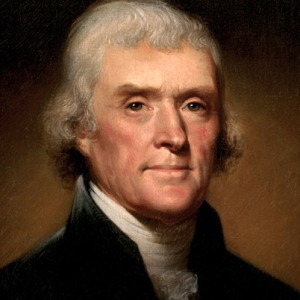I recently participated in a debate on the faith of the founders of the United States. I must say it is somewhat entertaining to see the lack of knowledge many have on this topic. There is this misconception that they were all “good Christian men.” The fact is – they weren’t. Most of them were deists and would likely (by today’s standards) ended up as atheists given the advancements of science since their deaths as well as the pangs of history like the Holocaust and other genocides that have occurred since their deaths. So maybe I will do a little series on the faith of the founders and since it was Jefferson that I spoke of this week, I may as well use the same subject here. 
For starters Thomas Jefferson rejected the divinity of Jesus, the infallibility and inerrancy of the Bible, and the relevance and authenticity of the church at the time (imagine what he would think now)
To the corruptions of Christianity I am indeed opposed; but not to the genuine precepts of Jesus himself. I am a Christian, in the only sense he wished any one to be; sincerely attached to his doctrines, in preference to all others; ascribing to himself every human excellence; & believing he never claimed any other. – Letter to Benjamin Rush in 1803
It is an indisputable fact that although Jefferson was critical of the Bible and the Church, he did admire the moral code of Jesus but also acknowledges that it was not a moral code that Jesus invented as it was one that early non-temple cult rabbis had (like Hillel) as well as a number of other moral philosophers that predate the writings of the nomadic tribes of the Hebrews.
Jefferson was a man of his own sect – he thought for himself. At best he was a Unitarian and in reality a deist or universal theist who was just a skeptic who liked to read.
Here is a nice nugget he wrote as well which in my opinion is spot on and can be found as a preface to the “Jefferson Bible” (more on that a little later):
“SYLLABUS OF AN ESTIMATE OF THE DOCTRINES OF JESUS, COMPARED WITH THOSE OF OTHERS.
In a comparative view of the ethics of the enlightened nations of antiquity, of the Jews, and of Jesus, no notice should be taken of the corruptions of reason among the ancients, to wit, the idolatry and superstition of the vulgar, nor of the corruptions of Christianity by the learned among its professors. Let a just view be taken of the moral principles inculcated by the most esteemed of the sects of ancient philosophy, or of their individuals; particularly Pythagoras, Socrates, Epicurus, Cicero, Epictetus, Seneca, Antoninus.
I. PHILOSOPHERS.
1. Their precepts related chiefly to ourselves, and the government of those passions which, unrestrained, would disturb our tranquility of mind. In this branch of philosophy they were really great.
2. In developing our duties to others, they were short and defective. They embraced indeed the circles of kindred and friends, and inculcated patriotism, or the love of country in the aggregate, as a primary obligation: towards our neighbors and countrymen they taught justice, but scarcely viewed them as within the circle of benevolence. Still less have they inculcated peace, charity, and love to our fellow-men, or embraced with benevolence the whole family of mankind.
II. JEWS.
1. Their system was Deism, that is, the belief in one only God; but their ideas of him and of his attributes were degrading and injurious.
2. Their ethics were not only imperfect, but often irreconcilable with the sound dictates of reason and morality, as they respect intercourse with those around us; and repulsive and anti-social as respecting other nations. They needed reformation, therefore, in an eminent degree.
III. JESUS.
In this state of things among the Jews, Jesus appeared. His parentage was obscure; his condition poor; his education null; his natural endowments great; his life correct and innocent. He was meek, benevolent, patient, firm, disinterested, and of the sublimest eloquence. The disadvantages under which his doctrines appear are remarkable.
- Like Socrates and Epictetus, he wrote nothing himself.
- But he had not, like them, a Xenophon or an Arrian to write for him. I name not Plato, who only used the name of Socrates to cover the whimsies of his own brain.On the contrary, all the learned of his country, entrenched in its power and riches, were opposed to him, lest his labors should undermine their advantages; and the committing to writing of his life and doctrines fell on unlettered and ignorant men; who wrote, too, from memory, and not till long after the transactions had passed.
- According to the ordinary fate of those who attempt to enlighten and reform mankind, he fell an early victim to the jealousy and combination of the altar and the throne, at about 33 years of age, his reason having not yet attained the maximum of its energy, nor the course of his preaching, which was but of three years at most, presented occasions for developing a complete system of morals.
- Hence the doctrines which he really delivered were defective, as a whole, and fragments only of what he did deliver have come to us mutilated, misstated, and often unintelligible.
- They have been still more disfigured by the corruptions of schismatizing followers, who have found an interest in sophisticating and perverting the simple doctrines he taught, by engrafting on them the mysticisms of a Grecian Sophist (Plato), frittering them into subtilties and obscuring them with jargon, until they have caused good men to reject the whole in disgust, and to view Jesus himself as an impostor.
Notwithstanding these disadvantages, a system of morals is presented to us which, if filled up in the true style and spirit of the rich fragments he left us, would be the most perfect and sublime that has ever been taught by man. The question of his being a member of the Godhead, or in direct communication with it, claimed for him by some of his followers, and denied by others, is foreign to the present view, which is merely an estimate of the intrinsic merits of his doctrines.
- He corrected the Deism of the Jews, confirming them in their belief of one only god, and giving them juster notions of his attributes and government.
- His moral doctrines, relating to kindred and friends, were more pure and perfect than those of the most correct of the philosophers, and greatly more so than those of the Jews; and they went far beyond both in inculcating universal philanthrophy, not only to kindred and friends, to neighbors and countrymen, but to all mankind, gathering all into one family, under the bonds of love, charity, peace, common wants and common aids. A development of this head will evince the peculiar superiority of the system of Jesus over all others.
- The precepts of philosophy and of the Hebrew code laid hold of action only. He pushed his scrutinies into the heart of man; erected his tribunal in the region of his thought, and purified the waters at the fountain head.
- He taught emphatically the doctrine of a future state, which was either doubted or disbelieved by the Jews; and wielded it with efficacy as an important incentive, supplementary to the other motives to moral conduct.
I, too, have made a wee-little book from the same materials (The Gospels) which I call the Philosophy of Jesus. It is a paradigma of his doctrines, made by cutting the texts out of the book and arranging them on the pages of a blank book, in a certain order of time or subject. A more beautiful or precious morsel of ethics I have never seen. It is a document in proof that I am a REAL CHRISTIAN, that is to say, a disciple of the doctrines of Jesus, very different from the Platonists, who call ME infidel and THEMSELVES Christians and preachers of the Gospel, while they draw all their characteristic dogmas from what its author never said nor saw. They have compounded from the heathen mysteries a system beyond the comprehension of man, of which the great reformer of the vicious ethics and deism of the Jews, were he to return on earth, would not recognize one feature.”— Letter from Jefferson to Mr. Charles Thompson.
Note the words “wee little book”… To Jefferson the Bible was so bad that he literally cut out the only worthwhile portions of Jesus’ life and teachings and compiled his own “wee little book”. Copies of this book were given to Members of Congress shortly after it was discovered up until the 1950’s when the evangelicals seized control of the government out of fear of the Soviets and us needing “god on our side” (as if the little children in Ethiopia could wait – we were more important). I own a copy and I recommend it to anyone. A side note – “In God we Trust” became the motto in the 1950 and “Under God” was added in the 1950’s as well – so this “God and country” thing is not our heritage.
Here is a link to the Jefferson Bible (with actual pictures of it): http://americanhistory.si.edu/JeffersonBible/
Any questions?





 moral exemplar for all of us. Whether one professes the Christian faith or not, no one can deny that th
moral exemplar for all of us. Whether one professes the Christian faith or not, no one can deny that th
